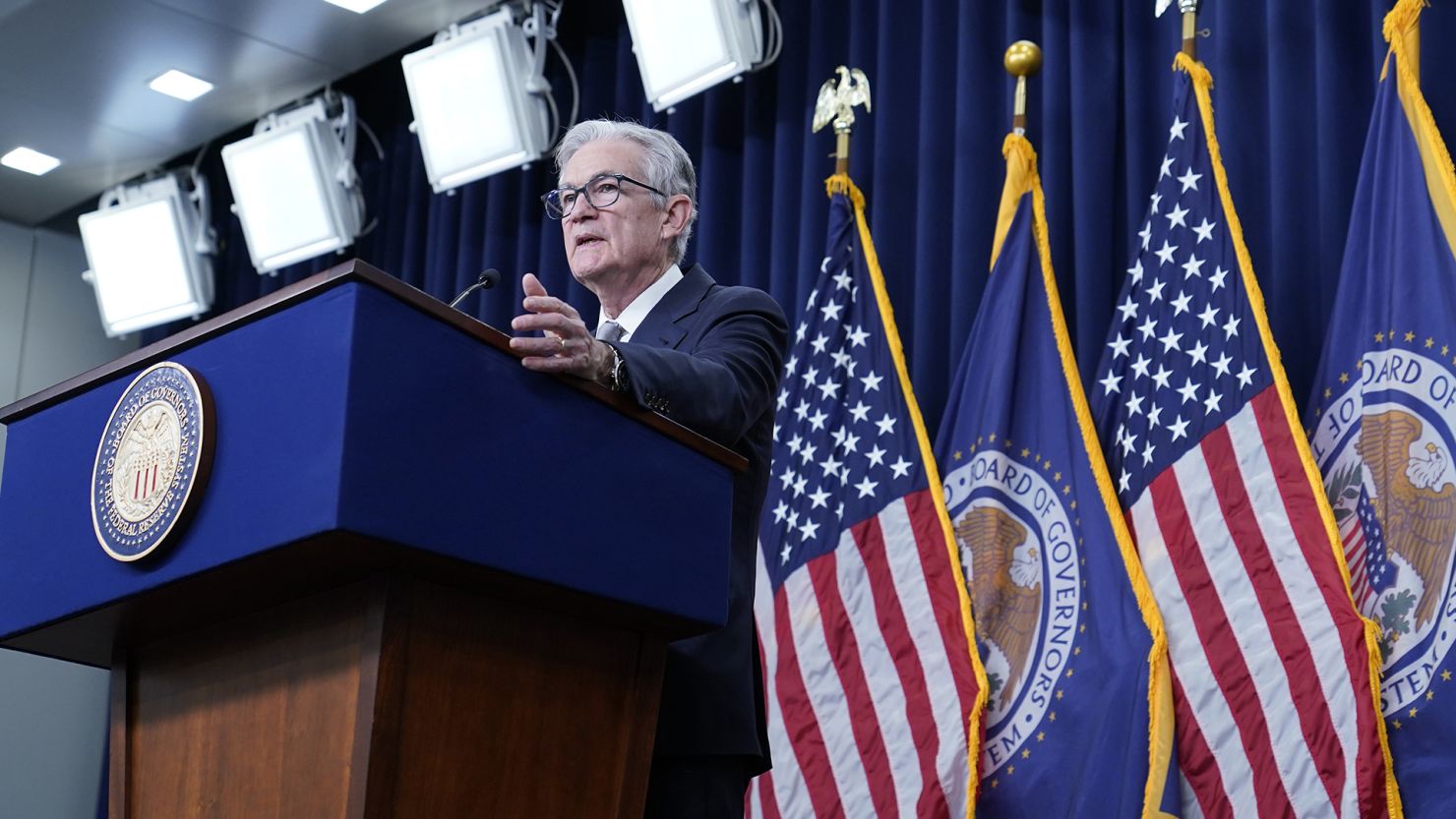The Federal Reserve said Wednesday it will hold interest rates steady at a 22-year high for the third consecutive meeting, as US economic growth slows and investors look toward the beginning of rate cuts sometime next year.
The Fed has raised rates 11 times since March 2022 to combat high inflation, which has slowed markedly after hitting a four-decade high last summer.
Still, the central bank hasn’t crossed the finish line just yet. Fed officials are expecting inflation to cool next year at a slightly faster pace than previously estimated, according to their latest set of economic projections, released Wednesday.
Some economists say the final mile of the Fed’s historic inflation fight will be the most difficult. In his post-meeting news conference, Fed Chair Jerome Powell reiterated that additional rate hikes remain on the table.
But Wall Street isn’t buying that. The first rate cut could come in March, according to futures, though the odds of a May rate cut are slightly better. Stocks rallied, despite Powell floating the possibility of more rate increases, with the Dow reaching an all-time intraday high.
The central bank’s post-meeting statement noted that “inflation has eased over the past year but remains elevated,” which is a change from the usual sentence simply stating that “inflation remains elevated.”
“The Fed has given the market an early holiday gift today when, finally, for the first time, they have commented positively about inflation,” Gina Bolvin, president of Bolvin Wealth Management Group, wrote in a note.
”It appears that the Fed is moving in the markets direction, rather than the market moving towards the Fed. The Santa Claus rally may continue,” she added.
The Fed’s decision Wednesday likely means the end of rate hikes this cycle since inflation is not expected to reignite next year, according to officials’ latest estimates.
Powell addresses rate cuts
As expected, the Fed chief got peppered with questions from reporters on the central bank’s approach to cutting rates.
Powell said “no one is declaring victory” just yet, and that doing so would be “premature,” but he admitted that officials are, at the very least, already discussing rate cuts.
“The question of when will it become appropriate to begin dialing back policy, that begins to come into view and is clearly a topic of discussion now in the world and was also a discussion for us at our meeting today,” Powell said.
A key question for the Fed early next year will be: What are the criteria for rate cuts?
Powell said “you want to be reducing restriction on the economy well before 2%.” He said that waiting to cut rates until inflation reaches 2% would “be too late.”
The Fed’s latest estimates also showed that officials now expect more rate cuts next year than previously estimated — three quarter-point cuts in 2024. That bodes well for America’s frozen housing market hamstrung by high mortgage rates and weak demand.
Generally, there are different reasons why the Fed could begin to cut interest rates. One reason is because an economic downturn is ratcheting up unemployment, and another is because inflation is back to the Fed’s 2% target, or on its way there. Not cutting rates in such a scenario would mean the economy is being weighed down by higher rates with inflation low.
Powell said officials are “very conscious” of rising inflation-adjusted interest rates. That seems to be one thing the Fed will consider when determining rate cuts.
The Fed could also cut rates if inflation slips below 2%, similar to the years leading up to the Covid-19 pandemic.
For now, some are hopeful the central bank is in the midst of achieving the elusive soft landing — a scenario in which inflation returns to the Fed’s target without a sharp rise in unemployment. Such a feat is extremely rare, with some saying it has only happened once in the 1990s. Others argue soft landings have been a bit more common than that.
The US economy remains in good shape — for now
The job market has slowed steadily, but remains solid. US economic growth has cooled dramatically from its red-hot pace in the third quarter, but growth remains in positive territory as the year comes to a close. Black Friday and Cyber Monday sales were record setting.
Treasury Secretary Janet Yellen said in a Wednesday interview with CNBC that “the baseline here is very good” and that risks to the economy are “not outsized to my thinking.”
Indeed, the economy remains resilient in the face of elevated interest rates, which is why some have grown more confident about the prospect of a soft landing — but that still isn’t guaranteed. And even though inflation remains above 2%, the Fed still has a lot to be happy about.
But 2024 will certainly put the economy’s resilience to the test. Americans are continuing to draw down their pandemic savings as their credit card balances grow and economists are expecting the Commerce Department to report Thursday that seasonally adjusted retail sales fell in November for the second straight month, according to FactSet.
“Despite significant progress on inflation and strong economic growth, we believe a “soft landing” — where inflation returns sustainably to the Federal Reserve’s target absent weakness in demand — is unlikely.
The last mile on the path to 2% inflation will be the most difficult,” Vanguard said in an analyst note Wednesday.
“In the year ahead, we expect a combination of below-trend growth, rising unemployment, and slowing wage growth. This would occur as the labor market loosens, in large part because of higher-than-expected labor supply growth.”










